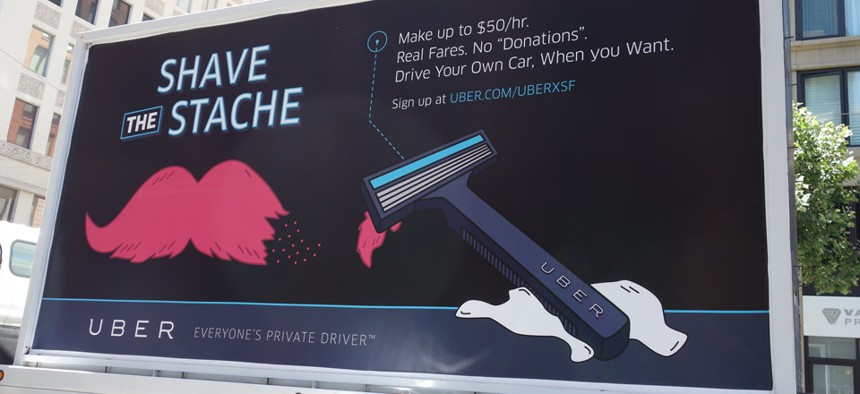
Uber has been accused of trying to poach drivers from Lyft with its ads in San Francisco. Flickr user ari
Uber’s War on Lyft Could Prompt Federal Investigation
The ride-share service’s apparent attempts to sabotage its competitors might become red meat for the Federal Trade Commission or state attorneys general.
Uber is the darling of Democrats and Republicans alike, but the company's cutthroat campaign against its ride-share rivals could land it in hot water with state and federal regulators.
The company has reportedly equipped an army of independent contractors with burner phones and credit cards as part of a "sophisticated effort to undermine Lyft and other competitors" and poach drivers, according to an article published by The Verge this week.
The San Francisco start-up's aggressive recruitment methods are already well documented, but the size and sophistication of its exploits revealed by The Verge could warrant an antitrust investigation by the Federal Trade Commission or state attorneys general, according to several antitrust experts and former government officials interviewed by National Journal.
A former FTC official, who spoke on the condition of anonymity, said that reports of Uber's misrepresentation aligns strongly with similar antitrust investigations the agency has conducted in the past.
"The heart of what's offensive here, the indispensable ingredient, is the canceled orders," the official said. "That kind of behavior would be seen as having no redeeming benefits at all, poses competitive burdens, and falls within the conception of unfair competition."
Uber stands accused of employing street teams of contractors to disrupt Lyft's launch plans in New York City who were handed "two Uber-branded iPhones and a series of valid credit-card numbers to be used for creating dummy Lyft accounts." Uber has also allegedly made a habit of ordering Lyft rides and canceling them to avoid detection, a method that would prompt rival drivers to waste time driving to the pickup spot. Lyft contends Uber has caused thousands of canceled rides, something Uber denies was done intentionally.
Solely ordering a Lyft ride and trying to convince the driver to switch sides is likely not enough to merit an inquiry by the FTC, which polices against "unfair" and "deceptive" business practices, said David Balto, a former policy director at FTC and an antitrust lawyer.
But the apparent sophistication and duplicity of Uber's so-called "Operation SLOG" in New York City raises antitrust concerns. "The calling and canceling would make it very difficult for [Lyft] to effectively operate," Balto added. "That's the kind of thing that could very well be investigated by the FTC."
"Uber may be a 21st-century innovator, but it looks like it's pulling out the tactics of a 19th-century robber baron," Balto said. "Some of these tactics are things that John D. Rockefeller would be proud of."
In a blog post published shortly before The Verge's story, Uber denied it ever intentionally cancels rides, but acknowledged that "we can't successfully recruit drivers without talking to them—and that means taking a ride."
"We're all about more and better economic opportunity for drivers," the company wrote. "We never use marketing tactics that prevent a driver from making their living—and that includes never intentionally canceling rides."
Uber, which now boasts a presence in more than 160 cities around the world, is confronting a new wave of scrutiny just a week after hiring former Obama campaign wizard David Plouffe to lead its policy team. In announcing his new gig, Plouffe wrote that he was eager take on Uber's main opponent, the "Big Taxi cartel," which he maintains "has used decades of political contributions and influence to restrict competition, reduce choice for consumers, and put a stranglehold on economic opportunity for its drivers."
The tech company has also recently earned the adoration of a number of Republicans looking to curry favor with its young, largely urban base.
Earlier this month, the Republican National Committee launched a petition soliciting support for "innovative companies like Uber," in response to backlash from the traditional taxi lobby and ride-sharing regulations proposed in some cities and states. And Sen. Marco Rubio has touted the company as an example of free-market ingenuity that should not be subject to strict regulatory red tape.
The company's success, size, and influence is likely to increase the chances of triggering either a regulatory investigation or private litigation, said Richard Feinstein, former director of the FTC's antitrust enforcement.
The FTC has historically been an ally to the booming app-driven ride-sharing industry. In April, the agency wrote a letter articulating its belief that regulations should be limited to safety and consumer protection and not for the purposes of levying higher license fees than those placed on traditional taxi fleets.
An Uber spokesman accused The Verge story of being thinly sourced and revealing nothing new, telling National Journal that it lacks "any verification" of the claims or documents published.
Uber has never publicly taken responsibility for reports of employees ordering phony rides from Lyft. In January, the company issued an apology on its website acknowledging that some employees in New York were "too aggressive" in its tactics of ordering rides from competitors and canceling them moments later. But the apology indicated the tactics were orchestrated by local staffers and not approved or initiated by corporate higher ups.
"We have messaged city teams to curtail activities that seek lead generation in this manner," the company wrote.
Lyft did not respond to a request for comment for this story.
(Image via Flickr user ari)
NEXT STORY: Is There a Better Way to Measure Earthquakes?







